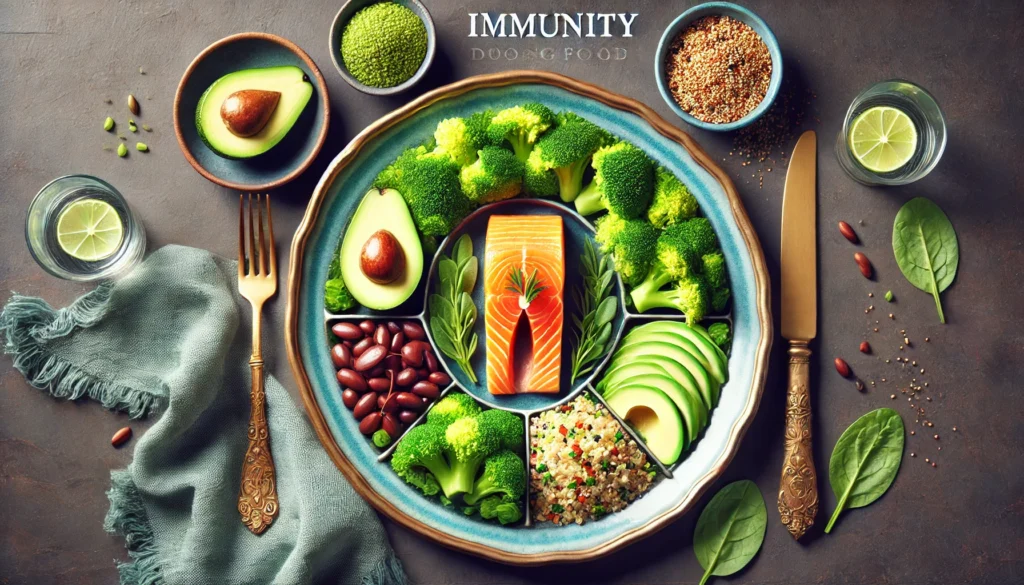In an era where health and wellness are at the forefront of our minds, understanding the role of nutrition in supporting the immune system is paramount. Whether you’re a health and wellness coach, a science journalist, or a biohacker, the quest for reliable and comprehensive information on this topic is universal. This article delves into the intricate relationship between diet and immune function, offering a detailed and thought-provoking exploration of the top foods that can bolster your immunity.
You may also like: Memory-Boosting Foods You Should Try Today
The Science Behind Immunity and Nutrition
Our immune system is a complex network of cells, tissues, and organs that work together to defend our bodies against harmful pathogens. Nutrition plays a crucial role in maintaining the balance and functionality of this system. The vitamins, minerals, and antioxidants found in certain foods have been shown to enhance immune responses and reduce the risk of infections.
The Immune System: An Overview
The immune system is our body’s natural defense mechanism, protecting us from infections and diseases. It comprises two main components: the innate and adaptive immune systems. The innate immune system provides a general defense against pathogens, while the adaptive immune system targets specific threats. Both systems rely heavily on adequate nutrition to function optimally.
Nutrients Essential for Immune Health
Key nutrients such as vitamins A, C, D, and E, along with minerals like zinc and selenium, are vital for immune health. These nutrients support the production and activity of immune cells and antibodies. A deficiency in any of these can lead to impaired immune function, increasing susceptibility to infections.
Antioxidants and Their Role
Antioxidants are compounds that help neutralize harmful free radicals in the body, reducing oxidative stress. Oxidative stress can damage cells and tissues, weakening the immune system. Foods rich in antioxidants, such as berries, nuts, and leafy greens, help protect the body by maintaining cellular health and boosting immunity.
Historical Context of Diet and Immunity
The connection between diet and immune health is not a new concept. Ancient civilizations, such as those in Greece and China, have long recognized the healing properties of certain foods. Hippocrates, often referred to as the father of medicine, famously stated, “Let food be thy medicine, and let medicine be thy food.” This philosophy underscores the timeless understanding that nutrition is a cornerstone of health.
Ancient Wisdom and Food as Medicine
In ancient times, food was not only a source of nourishment but also a form of medicine. Traditional Chinese Medicine and Ayurveda have long used food to treat and prevent illnesses. These ancient practices highlight the importance of balancing different foods to maintain health and enhance immunity.
Hippocrates and His Influence
Hippocrates’ teachings laid the foundation for modern medicine, emphasizing the role of diet in health. His belief that food can be both nourishing and healing continues to influence contemporary approaches to nutrition and immunity. The emphasis on natural foods rich in nutrients reflects his philosophy.
Evolution of Nutritional Science
Over the centuries, our understanding of nutrition and immunity has evolved. The discovery of vitamins and their specific roles in immune function marked significant milestones. Today, research continues to explore the complex interactions between diet, gut health, and immunity, building on the knowledge of ancient healers.
Current Trends in Immune-Boosting Foods
In recent years, there has been a surge in interest around foods that can enhance immunity. With the global health landscape being shaped by pandemics and lifestyle-related diseases, the demand for foods that promote immune health has never been greater. Let’s explore some of the most potent immune-boosting foods available today.
Citrus Fruits
Citrus fruits like oranges, grapefruits, lemons, and limes are renowned for their high vitamin C content. Vitamin C is a powerful antioxidant that helps combat free radicals, supports the production of white blood cells, and enhances the overall immune function. Incorporating these fruits into your daily diet can be a delicious and effective way to boost your immunity.

The Benefits of Vitamin C
Vitamin C is crucial for the growth and repair of tissues in all parts of the body. It helps heal wounds and maintains healthy skin, which acts as a barrier against pathogens. Regular intake of vitamin C-rich foods can shorten the duration of cold symptoms and improve resistance to certain infections.
Beyond Oranges: Variety is Key
While oranges are a popular source of vitamin C, other citrus fruits like grapefruits and lemons also offer significant benefits. Each fruit provides a unique flavor profile and additional nutrients, such as fiber and flavonoids, which contribute to overall health. Including a variety of citrus fruits can maximize the immune-boosting effects.
Creative Ways to Enjoy Citrus
Incorporating citrus fruits into your diet doesn’t have to be boring. Try adding lemon slices to your water, using lime juice in dressings, or snacking on grapefruit segments. These simple additions can enhance flavor and nutrition, making it easier to enjoy the health benefits of citrus fruits.
Leafy Greens
Leafy greens such as spinach, kale, and Swiss chard are rich in vitamins A, C, and E, as well as antioxidants and fiber. These nutrients are essential for maintaining a healthy immune system, as they help protect against cellular damage and support the body’s natural defense mechanisms.
The Nutrient Powerhouse
Leafy greens are a powerhouse of nutrients essential for immune health. They contain beta-carotene, which the body converts into vitamin A, crucial for maintaining mucosal surfaces in the respiratory tract. This function helps prevent pathogens from entering the body.
Versatile and Delicious
Leafy greens are incredibly versatile and can be added to a variety of dishes. Whether tossed in salads, blended into smoothies, or sautéed with garlic, their mild flavor complements many cuisines. This versatility makes it easy to incorporate them into your daily meals.
Cultivating a Habit
Making leafy greens a regular part of your diet may require a conscious effort. Start by incorporating them into one meal a day, gradually increasing your intake. Over time, this habit can lead to improved immune function and overall health.
Nuts and Seeds
Nuts and seeds, including almonds, sunflower seeds, and flaxseeds, are excellent sources of vitamin E and zinc. Vitamin E is a potent antioxidant that helps protect cells from oxidative damage, while zinc is crucial for immune cell development and communication. Regular consumption of these nutrient-dense foods can significantly enhance immune function.
The Role of Vitamin E
Vitamin E is a fat-soluble vitamin that acts as an antioxidant, protecting cell membranes from damage. It enhances the body’s immune response by supporting the production of B-cells, which produce antibodies. Including vitamin E-rich foods like almonds in your diet can strengthen your immunity.
Zinc: A Trace Mineral with a Big Impact
Zinc plays a vital role in maintaining the integrity of the immune system. It supports the function of various immune cells, including neutrophils and natural killer cells. A diet lacking in zinc can lead to impaired immune responses, making nuts and seeds an important dietary addition.
Simple Ways to Add Nuts and Seeds
Incorporating nuts and seeds into your diet can be simple and satisfying. Sprinkle sunflower seeds on salads, add flaxseeds to smoothies, or enjoy almonds as a snack. These small changes can have a big impact on your immune health over time.
Future Implications of Nutritional Immunology
As our understanding of nutritional immunology continues to evolve, we can anticipate further breakthroughs in how diet influences immune health. Future research may uncover new superfoods or supplements that can provide even greater immune support. Additionally, advances in personalized nutrition could allow for tailored dietary recommendations based on individual genetic and lifestyle factors.

The Rise of Superfoods
Superfoods are nutrient-rich foods considered particularly beneficial for health. As research progresses, we may discover new superfoods with enhanced immune-boosting properties. These foods could become staples in diets aimed at improving immune function and overall health.
Personalized Nutrition and Genetic Insights
Advancements in genetic testing and personalized nutrition are paving the way for individualized dietary plans. Understanding how genetics influence nutrient absorption and immune responses can lead to tailored recommendations. This approach may optimize immune health by addressing specific nutritional needs.
The Role of Technology in Nutrition
Technology is transforming the way we approach nutrition and immunity. From apps that track nutrient intake to devices that monitor health markers, technology can provide insights into dietary habits and their effects on immune health. These tools can empower individuals to make informed dietary choices.
Practical Advice for Enhancing Immune Health
While focusing on specific immune-boosting foods is beneficial, it’s important to remember that a balanced and varied diet is key to overall health. Here are some practical tips to help you optimize your diet for immune support:
Diversify Your Plate
Aim for a colorful array of fruits and vegetables to ensure a broad spectrum of vitamins and minerals. A varied diet not only provides essential nutrients but also keeps meals interesting and satisfying. Experiment with different produce to discover new flavors and health benefits.
Stay Hydrated
Adequate hydration is essential for maintaining the health of mucosal membranes, which are a critical component of the immune system’s first line of defense. Drinking plenty of water supports digestion and nutrient absorption, helping the body function optimally.
Limit Processed Foods
High sugar and processed food intake can suppress immune function, so opt for whole, nutrient-dense foods whenever possible. Processed foods often lack essential nutrients and contain additives that can negatively impact health. Making mindful choices can improve immune resilience.
Consider Supplements
If you’re unable to meet your nutritional needs through diet alone, consider supplements for key nutrients like vitamin D, vitamin C, and zinc, but consult with a healthcare provider first. Supplements can be a helpful addition but should not replace a balanced diet.

Conclusion
Understanding the intricate relationship between diet and immunity empowers us to make informed choices that can enhance our health and well-being. By incorporating a variety of immune-boosting foods into our diets, we can support our body’s natural defense mechanisms and improve our resilience to illness. As we continue to explore the fascinating world of nutritional immunology, we can look forward to a future where diet plays an even more integral role in preventive health care.
In conclusion, the foods we choose to nourish our bodies with can have a profound impact on our immune health. By prioritizing a diet rich in vitamins, minerals, and antioxidants, we can bolster our defenses and pave the way for a healthier, more resilient future. As research continues to uncover new insights, embracing a diet tailored to immune support will become an essential aspect of modern health practices.
Further Reading:
15 Foods That Boost the Immune System
The best foods for boosting your immune system
11 Foods That Boost Your Immune System
Important Note: The information contained in this article is for general informational purposes only, and should not be construed as health or medical advice, nor is it intended to diagnose, prevent, treat, or cure any disease or health condition. Before embarking on any diet, fitness regimen, or program of nutritional supplementation, it is advisable to consult your healthcare professional in order to determine its safety and probable efficacy in terms of your individual state of health.
Regarding Nutritional Supplements Or Other Non-Prescription Health Products: If any nutritional supplements or other non-prescription health products are mentioned in the foregoing article, any claims or statements made about them have not been evaluated by the U.S. Food and Drug Administration, and such nutritional supplements or other health products are not intended to diagnose, treat, cure, or prevent any disease.


